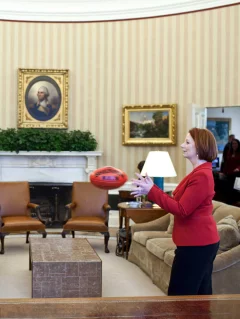You know you are 60 when you are in a lift (or supermarket) and your favourite song comes on — and getting lucky means a short wait at the doctor’s office.
The jokes are well-worn and predictable but are unlikely to make us chuckle if we have somehow managed to complete six decades on the planet.
Reaching that milestone tomorrow, I’m happy to sing my age from the rooftops, rather than ducking sheepishly for cover or changing the subject.
Other Australians to blow out 60 candles this year include actor Richard Roxburgh, director Baz Luhrmann and Rugby World Cup winner David Campese, while former Prime Minister Julia Gillard passed the landmark last September, a month after former US president Barack Obama.
To put things into perspective, we had all finished high school before Australia’s current Prime Minister had even started his secondary education, and almost three years before NSW Premier Dominic Perrottet was born.
For me, getting to 60 is a precious moment to be savoured and celebrated and certainly nothing to be ashamed of.
All the ups and downs, joys and miseries, triumphs and rejections give us a beautiful perspective that even our 50-year-old selves did not have. In theory, if not always in practice, many of the rough edges have been smoothed out by now.
As David Bowie once said: “Ageing is an extraordinary process where you become the person you always should have been.”
The writer of this article, with his mother, Diana, in 1962, when Robert Menzies was prime minister.(Supplied: Jason Dasey)Those of us born in 1962 came into the world when Robert Menzies was Australia’s prime minister, when president John F Kennedy and the US were transfixed by the Cuban Missile Crisis and when the UK heard the classic line-up of The Beatles for the first time.
Indeed, Paul McCartney’s When I’m 64 — doing the garden and knitting a sweater by the fireside — suddenly seems relevant (but I guess I’ve got another 48 months before my under-utilised green fingers and crocheting hands come to the fore?)
Most Australians say ageism is ‘a problem’So why are so many Australians less-than-jubilant about hitting the big 6-0?
There might be a clue in last year’s survey on ageism.
The Australian Human Rights Commission unearthed some shocking statistics about our nation’s attitudes towards older people in its report, What’s Age Got to Do With It?
It found 90 per cent of Australians its researchers spoke to believe that ageism exists, 83 per cent say it is a problem, while more than half — 63 per cent — had experienced ageism in the past five years.
Among the key findings across the survey’s 11 focus groups: Australians see older people as nice, if frail, onlookers to life, rather than key participants.
People in their 60s are not always given jobs but. instead, are offered help they don’t want, the ageism survey finds.(Unsplash: Huy Phan)The survey also found that those in the 40-61 year age group are most likely to encounter ageism in being turned down for a job, while those above 62 years of age will experience it by being “helped” without being asked.
A Canadian friend in Melbourne working in sales refuses to let his company know his true age — he’s 56 but they think he’s 43 — and has gone to the trouble of setting himself up as a sole trader so he won’t have to disclose his date of birth on an employment form.
But is 60 — statistically, entering a higher-risk category in terms of COVID-19 outcomes — actually “old”?
It certainly was in 1962, when the average life expectancy for an Australian man was just 67.84 years (and 74.2 years for women).
Based on those numbers, I would not be around to watch the 2032 Olympics in my adopted hometown of Brisbane in just 10 years’ time.
Today, Australia’s life expectancy has risen to 81.5 years for men and 85.3 years for women.
How did baby boomers survive the 1970s? Loading
That seems almost a miracle when you consider what Australian 60-year-olds grew up with: asbestos in our houses, cigarettes in our lungs and not-so-healthy
Read More





